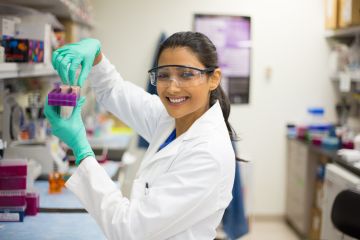
Why was this course developed?
The Certificate in Advanced Materials Characterisation was developed based on an analysis of the importance of the pharmaceutical and related industries in Ireland and within the South-East region and also using information generated from the Wales Ireland Network for Scientific Skills (WINSS) Scientific Survey from a large number of pharmaceutical/biotechnology, medical device and food companies. One of the outputs from this survey indicated that over 30% and 40% of companies require training in microscopy techniques, while 40% of companies require training in thermal analysis techniques. Companies also required training in surface measurement and particle sizing techniques, as well as other material characterisation techniques. Recognising this demand, the Certificate in Advanced Materials Characterisation was devised to provide advanced level training and address this skills deficit in these and other characterisation techniques.
This course was developed to provide the student with an overview of the current technologies used for the characterisation of materials in industrial applications The focus is mainly, but not exclusively, on the pharmaceutical and biopharmaceutical industries, from raw materials and product characterisation, to trace analysis and impurity determinations. The principles and instrumentation used in a range of techniques employed for surface analysis, polymorphism, trace analysis and polymer characterisations will be studied, focusing on their uses, sample requirements and limitations.
Students will get hands-on experience of the following materials characterisation techniques in laboratory practicals:
| • Differential Scanning Calorimetry (DSC) | • Atomic Force Microscopy (AFM) |
| • Thermogravimetric Analysis (TGA) | • X-ray Diffraction (XRD) |
| • Dynamic Vapour Sorption (DVS) | • Rheology and Powder Rheometry |
| • Particle Size Analysis (laser diffraction) | • Surface Area Analysis and Pore Size Measurements (Gas Sorption) |
| • Scanning Electron Microscopy (SEM) | • Solid-state Nuclear Magnetic Resonance (SS-NMR) spectroscopy |
What are the learning outcomes?
On successful completion of this module, a student will be able to:
- Explain the principles of operation behind a range of optical, scanning probe and scanning electron microscopic techniques.
- Explain the principles of operation and applications of a variety of micrometric and thermal analytical techniques for materials characterisation.
- Explain the principles of a variety of moisture, polymorphism, and particle size and rheology determinations in materials.
- Critically evaluate the potential of all the above in the characterisation of materials in the pharmaceutical industrial environment.
Competently operate and calibrate associated laboratory instrumentation for pharmaceutical and biopharmaceutical sample analyses.


Delivery
- The Certificate in Advanced Materials Characterisation programme is taught using a block approach on a part-time basis to facilitate students in full-time employment.
- Since this course is also offered as one module of the two year MSc in Analytical Science with Quality Management programme, the Certificate in Advanced Materials Characterisation is only offered once every two years.
- Over the duration of the programme, students will be required to attend SETU on our Waterford campus for approximately 7 – 8 days from January to June.
- This programme will be delivered through a blend of lectures, tutorial sessions and laboratory practicals, as well as independent study. Students will be required to attend SETU for four days of lectures, in addition to three to four days of laboratory practicals.
- Continuous assessment will be carried out throughout the course of the programme.
The Certificate in Advanced Materials Characterisation programme is aimed at those already working in the pharmaceutical, biopharmaceutical and food industries. This programme is also suitable for students intending to/already undertaking postgraduate research study.
Advanced Materials Characterisation Entry Requirements
Applicants for entry to this programme should hold a Level 8 Bachelor’s degree at honours level minimum 2.2 in an appropriate subject area or equivalent qualification
Applicants whose first language is not English must submit evidence of competency in English, please see English Language Requirements for details.
How to Apply
Once our application portal opens, the link to apply will appear on the course page above.
Subject to satisfying the aforementioned entry criteria, applicants will be offered places on a first-come-first-served basis per their application submission.
This course places a strong emphasis on the professional development of the graduate and is aimed at students already working in an industrial environment. Such a qualification will enable and facilitate career progression for graduates in the region.
Further study opportunities
This programme can be taken as a stand-alone Certificate worth 10 credits at level 9, or if the student wishes, they can use these credits towards the 60 credit Postgraduate Diploma in Analytical Science with Quality Management SE51H /SE51J or the 90 credit MSc in Analytical Science with Quality Management SE51H /SE51J
Stream Leaders

Dr Mike Kinsella
Lecturer in Chemistry/Organic Chemistry & Researcher, PMBRC -
Email: [email protected]
Profile
Dr Richie Ryan
Pharmaceutical Science Lecturer -
Call: +35351845509
Email: [email protected]
Profile
